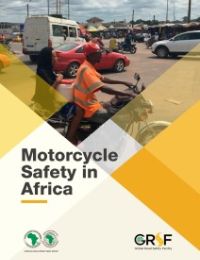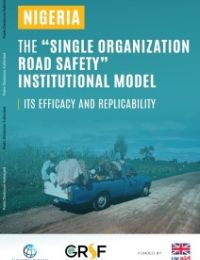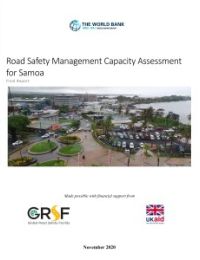Publications
1-3 of 3
-
- international literature and good practices on motorcycle safety;
- assessment of motorcycle crashes, regulations, risk exposure data, risk indicators in African countries (with more detailed analysis of Burkina Faso, Cameroon, Rwanda, and Uganda); and
- consultations with stakeholders.
-
Road Safety Management
Nigeria: The “Single Organization Road Safety” Institutional Model, its Efficacy and Replicability
July 2022
-
What are the strengths and weaknesses of this model and what could be done to improve its’ efficiency and effectiveness?
-
How efficient and effective is the “Single Organizational Model” institutional setup (both federal and state levels) in dealing with the road safety issues in Nigeria?
-
Can this model be replicated in other LMICs and what are the factors that will determine the replicability of the model in those countries?
-
What are the steps in setting up “Single Organizational Model” institutions in LMICs?
-
-
Utilize GRSF recommended methodology to gain a thorough understanding of road safety management capacity;
-
Assess institutional management arrangements as an important focus of the analysis of the road safety system in Samoa;
-
Consider the existing national road safety strategy—Samoa National Action Plan (SNAP) for the Decade of Action for Road Safety 2011-2020—and propose updates for the next period;
-
Provide capacity building on crash investigation and evidence-based road safety measures to ensure success and sustainability, with a focus on vulnerable road users such as females, children, and persons with disabilities; and,
-
Focus on crash data management, including providing hands on capacity building and crash analysis.
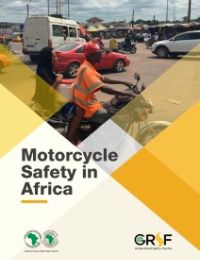
In developing countries with inadequate public transport and road infrastructure, motorcycles present a fast, cheap, and efficient transport alternative. Motorcycles are widely used in many African countries for personal and public transport, as well as for service delivery. In some African countries, motorized two and three-wheelers constitute the largest proportion of the motorized vehicle population. However, despite their benefits, motorcycles expose their riders and passengers to a high risk of serious injury or death in the event of crashes. Motorcycle safety is therefore a significant problem in Africa. On average, 22.5% of road traffic deaths in 2016 involved riders/passengers of two- and three-wheelers, according to the last data published by World Health Organization (WHO, 2018).
This research study presents comprehensive strategic recommendations on how to improve motorcycle safety in Africa. The study will serve as policy advice and technical assistance to the Bank’s regional member countries (RMCs). The study focuses on motorcycle safety conditions in Cameroon, Burkina Faso, Rwanda, and Uganda, where the use of motorcycles for daily activities is reputedly high. Recommendations are predicated on an examination of the major causes of motorcycle crashes and injuries, as well as an extensive body of knowledge from various sources, notably:
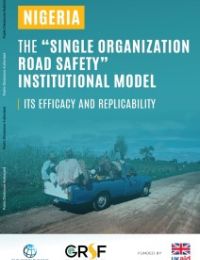
This study is one part of a comprehensive study of lead road safety agencies in low- and middle-income countries (LMICs), which is being conducted on a collaborative basis by the World Bank, the World Health Organization, and the African Development Bank. This particular study is supported by UK Aid through the World Bank’s Global Road Safety Facility (GRSF). It focuses on the case of Nigeria, a federal republic with three tiers of government - federal (central), state and local governments - and its single institutional model for road safety.
This report responds to the following questions:
Download the report to learn more!
RESOURCES ⌵︎
ACKNOWLEDGMENTS ⌵︎
‘The “Single Organization Road Safety” Institutional Model, its Efficacy and Replicability’ Study is supported by UK Aid through GRSF. The Report was written by three main authors: Martin Small, Mustapha Azzouzi and Arpita Roy. The study was led by Farhad Ahmed (Senior Transport Specialist) with support from Md. Towshikur Rahman, who was responsible for the overall coordination.
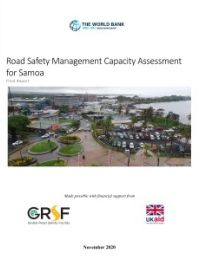
The Road Safety Management Capacity Assessment (RSMCA) is an activity within a broader Advisory Services and Analytics (ASA), which aims to gain a holistic and thorough understanding of the road safety management capacity of three selected Pacific Island Countries (PICs)—Samoa, the Solomon Islands and Vanuatu—in order to support their respective governments to develop national strategies and plans of action to improve road safety outcomes, with a focus on crash data management. The ASA will also support a pilot of the World Bank’s Data for Road Incident Visualization, Evaluation, and Reporting (DRIVER) road crash database in Samoa and provide hands on capacity building in crash analysis.
The ASA is being funded by a Global Road Safety Facility (GRSF) grant from the United Kingdom Agency for International Development (UK AID). The GRSF grant will help the Government of Samoa (GoS) to have a clear image of their road safety situation, risks and challenges, and further on to establish the basis for a national crash database. To ensure sustainability through capacity building and awareness-raising activities, knowledge will be shared with local stakeholders.
The key objectives of this ASA are as follows:
An auxiliary objective is to build capacity to use crash data to identify problems and implement road safety evidence-based measures in Samoa. Furthermore, given the negative impacts of severe weather events on road safety, which will be further exacerbated by climate change, the ASA will help to address the way that road safety is managed in the face of climate change, by training police officers to gain better skills in crash investigation.
The results from the DRIVER pilot in Samoa will be shared with counterparts in selected other PICs, with the aim of scaling up the system across the region. Only with accurate data can road safety be effectively managed and improved, and results measured. In support of this, as of October 2019, the World Bank’s Environmental and Social Framework (World Bank 2019) calls for road safety to be considered on all World Bank-funded projects.
The World Bank is also currently providing assistance to the road sector in Samoa through several projects, including the Samoa Climate Resilient Transport Project (SCRTP), which commenced in 2018. SCRTP will support the GoS to improve the climate resilience of the road network and provide key assistance required to contribute towards effectively managing climate resilient and safe road sector assets. One of the sub-components of SCRTP is dedicated to establishing and operationalizing a database for recording and analyzing road crash data.
The database will combine the existing siloed data, housed in different government agencies, into a single readily accessible platform under the Ministry of Work, Transport and Infrastructure (MWTI). The system will make use of DRIVER, to be piloted through this road safety ASA. SCRTP has other sub-components and activities focused on road safety, such as Road Safety Audits for project roads, a driver licensing training pilot focusing on women, and a road safety engineering technical assistance activity. This GRSF ASA will provide crucial data and insight for the successful delivery of the road safety program under SCRTP, plus other ongoing World Bank-financed projects.

